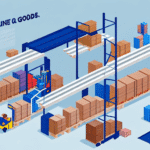Increasing Efficiency: The Role of Automation in Ecommerce Operations
The ecommerce industry is constantly evolving, with new trends and technologies emerging every year. One of the most significant recent developments is automation. This article delves into the nature of automated processes in ecommerce, examines the advantages of using automation, explores key considerations for implementation, and provides an overview of future trends in this field.
Benefits of Automation in Ecommerce
Increased Efficiency
Automation enhances operational efficiency by handling repetitive tasks swiftly and accurately. According to a Statista report, automated systems can reduce order processing times by up to 50%, leading to faster delivery and improved customer satisfaction.
Cost Savings
By minimizing manual labor, businesses can significantly cut down labor costs. Automation tools streamline operations, reducing the need for a large workforce and lowering overhead expenses.
Better Inventory Management
Automated inventory management systems track stock levels in real-time, preventing stockouts and overstock situations. This ensures a balanced supply chain and optimal inventory levels.
Improved Customer Experience
Automation personalizes customer interactions, from product recommendations to personalized marketing messages. This tailored approach enhances the overall shopping experience, fostering customer loyalty.
Key Areas of Automation in Ecommerce
Order Fulfillment
Automation in order fulfillment involves using robotic systems for picking and packing, automated transportation systems for moving products, and real-time tracking of deliveries. These systems reduce errors and accelerate the fulfillment process.
Customer Service
Automated customer service solutions, such as chatbots and automated email responses, provide instant support to customers. They handle common queries efficiently, ensuring customers receive timely assistance.
Marketing Automation
Automation tools in marketing manage email campaigns, social media postings, and targeted advertisements. They analyze customer data to create personalized marketing strategies, enhancing engagement and conversion rates.
Inventory Management
Automated inventory systems predict stock needs based on sales trends and historical data. This predictive capability helps in maintaining optimal inventory levels, reducing the risks of stockouts or excess inventory.
Shipping and Tracking
Automation in shipping involves generating shipping labels, calculating costs, and tracking deliveries in real-time. These tools ensure accurate and efficient shipping processes, improving the reliability of delivery services.
Implementing Automation in Your Ecommerce Business
Key Considerations
- Identify areas that will benefit most from automation based on business needs.
- Choose automation tools that are scalable and compatible with existing systems.
- Ensure compliance with data security and privacy regulations to protect customer information.
- Provide training to employees to adapt to new automated systems effectively.
Choosing the Right Automation Tools
Selecting the appropriate automation tools involves assessing your business requirements, comparing features and pricing, and considering the integration capabilities with your current ecommerce platform. Resources like Gartner’s ecommerce platform reviews can aid in making informed decisions.
Overcoming Implementation Challenges
- Employee Resistance: Address concerns through transparent communication and training programs.
- Technical Integration: Work with experienced vendors to ensure seamless integration of automation tools.
- Maintaining Quality Control: Balance automation with human oversight to uphold service quality.
Future Trends in Ecommerce Automation
The Role of Artificial Intelligence
Artificial Intelligence (AI) is set to further revolutionize ecommerce automation. AI-driven tools can provide advanced personalization, predictive analytics, and enhanced customer support through intelligent chatbots. According to a Forbes article, AI can increase ecommerce revenues by up to 30% by optimizing various operational aspects.
Enhanced Personalization
AI algorithms analyze customer behavior to deliver highly personalized shopping experiences, from product recommendations to customized marketing messages.
Predictive Analytics
AI-powered predictive analytics forecast sales trends, optimize pricing strategies, and improve inventory management, enabling businesses to make data-driven decisions.
Voice Commerce
With the rise of voice-activated devices, voice commerce is becoming more prevalent. Automation tools enable seamless voice-activated shopping experiences, catering to the growing demand for hands-free interactions.
Conclusion
Automation is integral to modern ecommerce operations, offering increased efficiency, cost savings, and enhanced customer experiences. By strategically implementing automation tools and staying abreast of emerging technologies like AI, ecommerce businesses can maintain a competitive edge and drive sustained growth.






















